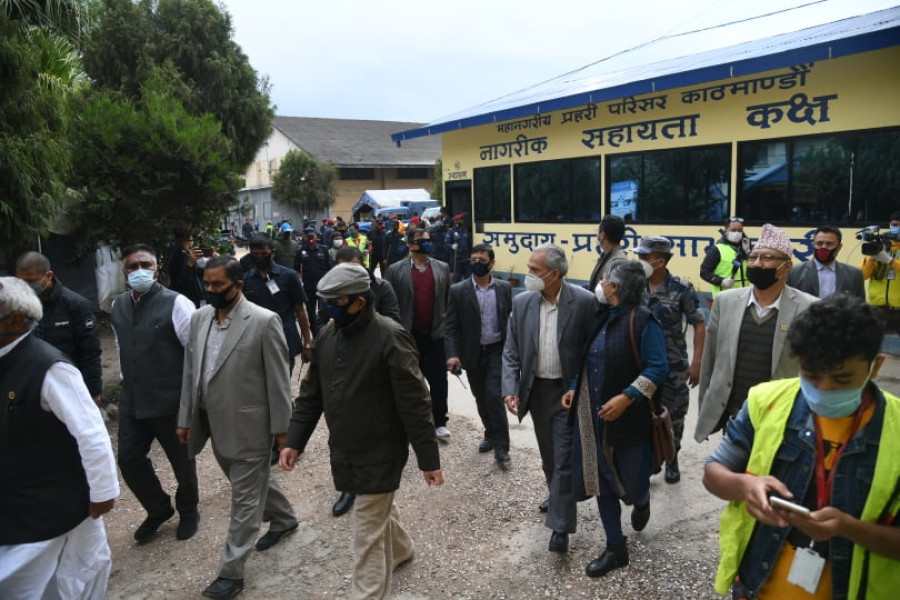National
Nepal Police’s refusal to register Surendra Yadav abduction case raises questions about its neutrality
Many believe police are acting on order from on high to not register the case, especially since it involves powerful political actors and a former chief of police.
Shuvam Dhungana & Tika R Pradhan
The saga of the alleged kidnapping of a Member of Parliament from Janakpur continues to unfold in a manner both bizarre but not unexpected.
Police on Sunday refused to register an abduction case against two Nepal Communist Party (NCP) leaders—Mahesh Basnet and Kisan Shrestha—and former police chief Sarbendra Khanal for their roles in the alleged kidnapping of lawmaker Surendra Yadav on Wednesday.
Leaders from the newly formed Janata Samajbadi Party, Nepal had approached the Metropolitan Police Range in Teku with a complaint that Yadav, one of their lawmakers, had been kidnapped from Janakpur by Basnet, Shrestha and Khanal and forcefully brought to Kathmandu.
“But the police refused to register the complaint as per orders from higher up,” said Rajendra Shrestha, a senior leader of the Janata Samajbadi party.
Yadav himself, along with party leaders Baburam Bhattarai, Upendra Yadav, Rajendra Mahato and others, had reached the police station on Sunday to file an abduction complaint, according to Superintendent Hobindra Bogati, spokesperson for the Kathmandu Metropolitan Police Range.
“Since the incident seems to have taken place in Mahottari, we were unable to register the complaint, as the area is not under our jurisdiction,” Bogati told the Post. “We requested them to file the complaint with the police in the area of the incident.”
However, the incident took place in the city of Janakpur, which is in the district of Dhanusha. Mahottari is Yadav’s home district.
Yadav’s alleged abduction was one of the events triggered by Prime Minister KP Sharma Oli’s controversial ordinances, issued on Monday. One of the ordinances that the Oli Cabinet pushed through sought to ease a party split, specifically the party that Yadav belonged to then—Samajbadi Party. Yadav was allegedly brought to Kathmandu in order to facilitate the split.
Though Basnet, Shrestha and Khanal have denied that they had kidnapped Yadav, all of them have admitted in various interviews that they had been to Janakpur to fetch Yadav and that they came to Kathmandu together.
Basnet had told the Post that he had been called to Janakpur for a discussion by some Samajbadi Party leaders who wanted to split the party. Last week, ruling party insiders also admitted to the Post that Oli had deployed some leaders to hold talks with the Samajbadi Party.
As many as seven Samajbadi Party leaders were planning to split the party and register a new party as per Oli’s scheme, according to leaders.
However, politics took a sudden turn when the Samajbadi Party and Rastriya Janata Party decided to merge, foiling Oli’s plan to split the third and fourth largest parties in Parliament one after another. The government subsequently withdrew the ordinance on Friday.
Janata Samajbadi Party leaders have now alleged that the Nepal Police is failing to do its duty by refusing to register a criminal case, especially since it involves the former inspector general.
“How can we believe the rule of law is upheld and people’s lives will be protected in Oli’s government when police refuse to register the case?” Bhattarai wrote on Twitter.
The allegations regarding Yadav’s abduction have become an albatross around Oli’s neck, as his own party leaders, who were already against the ordinances, are questioning his moral standing.
“The move to issue ordinances triggered a series of events that also include allegations that a lawmaker was kidnapped. Who’s answerable?” Jhala Nath Khanal, a senior ruling party leader and former prime minister, told the Post.
A majority of Nepal Communist Party Secretariat and Standing Committee members have been demanding a Standing Committee meeting for Oli to answer questions.
Amid allegations and counter-allegations, mostly over social media, calls were also growing for the accusers to file a case and for the accused to legally defend themselves.
“We approached the police today as we were deliberating,” said Shrestha. “Since police refused to take the case, now we are planning to consult a government attorney.”
Cases like abduction are government cases and, by law, the government attorney takes up such cases.
Numaraj Khanal, the Kathmandu district government attorney, said if a police office refuses to register a case, the complainants either need to file an application at the district government attorney’s office or reach out to a higher police office.
The police’s refusal to register a case by someone who is identifying himself as a victim shows dereliction of duty and if that is happening at direct orders from the people in power, it’s even more dangerous, say legal experts.
“Rejecting the application shows there is a clear influence of power. There is nothing called rule of law here,” said Bhimarjun Acharya, a senior advocate. “Since all those accused are in Kathmandu and the person who is making allegations was brought here, the police should register the case.”
Former police officials say that recent events associated with the Nepal Police have damaged the law enforcement agency’s image. The recent incident involving a former chief of police could do more harm to an institution that is already facing criticism for its manner of treating citizens.
At this very moment, police are under fire for arresting, at the behest of the government, a former government secretary over his social media posts.
According to former deputy inspector general Hemanta Malla, police officers could have felt pressure to reject the case since it is related to powerful political actors.
“But they could have accepted it and later transferred it to Mahottari police for further investigation,” said Malla.




 8.22°C Kathmandu
8.22°C Kathmandu















